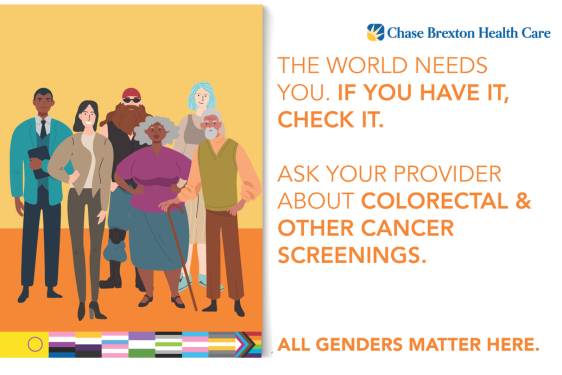Healthy and Beautiful Come in Every Shape, Size, Age, Race, and Gender Expression.
Am I Up-to-Date?
If you don't already have an appointment in the coming months, schedule one to focus on preventive health-what you can do today for a healthier tomorrow.
See below for some general guidelines for cancer screenings.
This video explains how to successfully complete your Cologuard colorectal cancer screening.

Here at Chase Brexton Health Care, we want to keep you healthy and cancer-free! Speak with your care team about your preventive health measures and cancer screening plan… make sure you know your family history of cancer and whether you are up to date.

Cancer screening tests are preventative measures to get done when you do not have any signs of cancer. A cancer screening test is done with the goal of “early detection” to avoid late-stage diagnosis.
The idea behind screening is to find cancer when it is tiny and not causing a problem, so that it can be cured. (It is kind of like finding a small leak in a boat before it does so much damage that the boat sinks!)
Cervical, breast, colorectal, lung, prostate, and anal cancers all have screening tests.
How do you know if you are due for a cancer screening? It depends! Factors such as your age, your anatomy (body parts), your family health history, and some health habits (like smoking cigarettes) will determine when is the right time to get screened!
To avoid dying of certain cancers (cervical, breast, colorectal, lung, prostate, anal), the main thing you can do is get cancer screenings done on time!
There are some things you can to do reduce your risk of getting cancer, such as:
- Healthy diet and exercise
- Get enough sleep
- Avoid smoking cigarettes
- Avoid heavy alcohol drinking
Speak with your health care team about your family history of cancer and a personalized preventative health care measure and cancer screening schedule at your next appointment!
If you are 45-75 years and had any of the following, with normal results, you are probably up to date!
•Colonoscopy in the last 10 years;
•Cologuard in the last three years;
•FIT test in the last year.
Colonoscopy results may include finding and removing polyps – these are growths that may eventually turn into cancerous tumors. If you had polyps, you likely need to repeat your colonoscopy screening tests more often, for example, every 3 to 5 years.
If you are 21-29 years old and you had a pap smear in the last three years and the results were normal – you are probably up to date!
If you are 30-65 years old – you have had a pap smear with an HPV test in the last 5 years and the result was normal – you are probably up to date!
Please share a copy of your results with your Chase Brexton provider, if you go to another office for your pap smear/HPV testing.
**People living with HIV typically need more frequent screening. Check with your provider!
If you are 40-75 years old and had a mammogram or other screening test done in the past two years, you are probably up to date.
Check with your care team to be sure!
Lung Cancer Screening is for individuals age 50-80 years who have a 20-pack year smoking history (for example, smoking 1 pack of cigarettes per day for 20 years, or 1/2 pack per day for 40 years) and who currently smoke or have stopped smoking within the last 15 years.
If you have had a CT scan of your chest within the last year and the results were normal, you are probably up to date.
Check with your care team to be sure!
What if I am not up to date? Schedule an appointment to discuss with your doctor. You can find more information about scheduling here: Appointment Scheduling | Chase Brexton Health Care
If you have had a colonoscopy or pap smear done in the last few years, make sure Chase Brexton has your record. Complete an ROI in your patient portal or request the office that took care of you to send the report to us.

